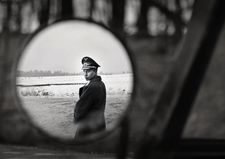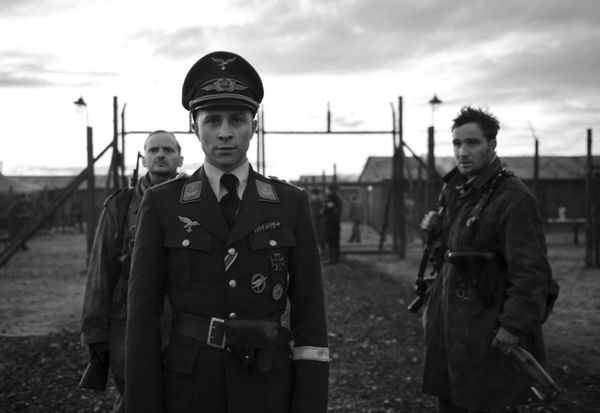 |
| Milan Peschel (Freytag), Max Hubacher (Willi Herold) and Frederick Lau (Kipinski) in Robert Schwentke's The Captain (Der Hauptmann) |
In his Hollywood career Robert Schwentke has directed Bruce Willis, Helen Mirren and Morgan Freeman for RED; Shailene Woodley, Jeff Daniels, Naomi Watts, and Miles Teller in Allegiant; Ryan Reynolds, Jeff Bridges and Mary-Louise Parker for R.I.P.D., and Jodie Foster, Peter Sarsgaard and Sean Bean for Flightplan.
In the final installment of my conversation with The Captain (Der Hauptmann) director/screenwriter Robert Schwentke he speaks about Alexander Fehling (star of Giulio Ricciarelli's Labyrinth Of Lies) and Frederick Lau's reaction to the captain's uniform, cites a line delivered by Max von Sydow in Woody Allen's Hannah And Her Sisters, agrees with Whit Stillman on Stanley Kubrick's expatriate perspective, recalls the reaction to his Family Jewels (Eierdiebe), and states that "every character in The Captain has a reason for what they're doing."
 |
| Robert Schwentke: "There's a great quote from JG Ballard, who is a writer I greatly admire, who says we're surrounded by fictions in our daily lives." Photo: Anne-Katrin Titze |
It is April 1945 and the war will be over in two short weeks. German Corporal Willi Herold (Max Hubacher), a deserter who only just escaped capture from the army by hiding in a hollow space beneath a tree, comes across an abandoned vehicle on a country road. It contains a basket of apples and a captain's uniform which, not counting the length of the pants, miraculously fits the desperate young man.
The Captain won the Stanley Kubrick Award for Bold and Innovative Filmmaking at Michael Moore's Traverse City Film Festival earlier this week.
Anne-Katrin Titze: When I spoke with Whit Stillman we ended up talking about Kubrick and how certain films are only possible from an expatriate perspective. You have to leave the country for certain insights.
Robert Schwentke: I think that's true.
AKT: Had you stayed in Germany, could you have made this film?
RS: I think there's a practical aspect to that question. I was lucky enough to explore a variety of genres and a variety of tonalities in my Hollywood career. I've always tried to take hard lefts and hard rights and to never repeat myself. If I had not explored those territories I would not have been able to make The Captain. Because, as you said, that was your first comment, it contains a variety of tones. I think I needed literally training and experience to do that.
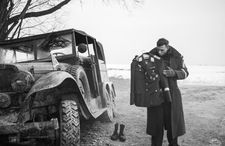 |
| German Corporal Willi Herold (Max Hubacher) finds a captain's uniform. |
AKT: And thematically? The distance from Germany?
RS: The thing is, I've been wanting to make this film for 12 years. I came across that story while I was still in Germany.
AKT: Are you living in both places now?
RS: I'm kind of living in both places now, yeah. We have a place in Berlin, but we're mostly in L.A.. But with my job, I live where I shoot. So I'm never really anywhere. My approach, even with my German films, has always been to come at things from a different angle.
I made a movie called Family Jewels, Eierdiebe, which was a cancer comedy, a very dark black cancer comedy. But it was an optimistic film about death. So it's not to be compared to The Captain, but it was based on my own story. And I was actually threatened with physical violence by a member of the audience when we screened the film.
He claimed and questioned: "Why would anybody make a film about cancer? One shouldn't make a film about cancer. But if one did make a film about cancer then definitely not the one you've made!" And I said, "Well, then we have a problem, because I've actually earned the right. I went through this. This is my story, I earned the right to talk about this however I please."
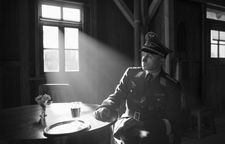 |
| Robert Schwentke on Corporal Willi Herold posing as the Captain: "If anything, they knew the power of the uniform and of a well-designed uniform." |
I've always had a hankering to tonally and otherwise come to certain subjects in a different way. The films I write myself I can do that much more easily. But even RED has its own weird tone.
AKT: I had to think of a line from Three Days Of The Condor, when Robert Redford says "Boy, what is it with you people? You think not getting caught in a lie is the same as telling the truth!"
RS: Right.
AKT: The bigger the lie, the easier it is to make people believe it?
RS: I think at the heart of what the National Socialists did is they were lying constantly. It was just all lying, every time. And whoever spoke the truth was punished for speaking the truth. After a time, truth becomes so relative.
There's a great quote from JG Ballard, who is a writer I greatly admire, who says we're surrounded by fictions in our daily lives. Our reality really is a fiction. And the job of a writer is not to create more fictions, but to speak the truth. I find this interesting, especially in these times we live in now, it's very hard to discern truth from fiction.
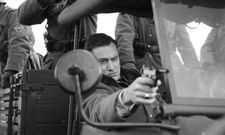 |
| Robert Schwentke on Alexander Fehling as Junker: "His character has a great mystery because you don't quite know whether he knows that this Captain is fake and whether he's just using him." |
AKT: The way the system is working and you show it in your film, is by making people complicit. In the lies and by making them guilty as well.
RS: Right. Which is the blood oath. It's the blood oath of the army.
AKT: There is no escaping that. Your film fully lays it bare.
RS: You read Christopher Brown's police battalion research [Ordinary Men: Reserve Police Battalion 101], and you see these were not even members of the military. These were members of a reserve police battalion and they were part of mass murders in Poland, that first wave of mass murders, and it took very little time for them to accept the fact that they would have five nights in the woods killing people.
Shooting them in the head. There was actually one guy who prided himself in only shooting women and children because he said it's an act of mercy. Because "I actually know how to shoot them and kill them." Rather than shoot them and have them still half alive and drown in their own blood in the pit.
AKT: Because nobody says "I am the bad guy."
RS: We have as human beings - and you were mentioning Kubrick earlier and I think that's at the heart of Kubrick's cinema as well - we as human beings have an incredible ability to rationalise our worst deeds. Nobody gets up in the morning and says "I will perpetrate a crime today". They all have reasons and justifications, they can all rationalise it. And I would venture that every character in The Captain has a reason for what they're doing.
AKT: There's Jean Renoir's dilemma from The Rules Of The Game: Everyone has their reasons. The only person who would say "I am the evil perpetrator" is someone out of a Brecht play.
RS: That's right. But they would be dancing at the same time.
AKT: Right. How was the reaction to The Captain in Germany?
RS: The reaction was very, very positive. People were happy that a film like that … No film like this existed yet in German cinema. And I think people felt that it was a step forward for us to be able to make a film like that. I wanted in this film to look at the dynamic structure of fascism.
I didn't want to make a film like Wannseekonferenz about the first row of perpetrators, the architects of the system. I wanted to make a film about the people who keep the system running. Even when the system doesn't exist anymore, they still keep it running. Because the system works for a variety of reasons, psychologically and other and it's self-perpetuating. And it's those people, it's our neighbors, the people we see on the street, who keep it running.
AKT: It's also the timing - with most of the survivors gone and unknown changes in the air.
RS: Right.
AKT: The eternal question in this: How could this happen? At the same time, is it happening again? And why not?
RS: There's that great line that Max von Sydow has in Crimes And Misdemeanors, no, Hannah And Her Sisters. Where he says: You know, I stopped asking myself how did it happen? And I started asking myself, why is it not happening more often?
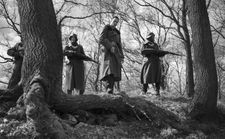 |
| Deserter Corporal Willi Herold (Max Hubacher) escapes capture by hiding from Junker (Alexander Fehling) in the roots of a tree. |
AKT: Yes, that's exactly right!
RS: That's the problem when you sever the present from the past. And you present the past as something that is not directly connected to us anymore, then you're doing exactly that. You're making something historical whereas it should be relevant.
AKT: "Das kommt nie wieder," there you go. It's all in this Lilian Harvey song which sums it up perfectly. As far as your actors are concerned, I was especially fascinated by the performance of Alexander Fehling. He is even better here than in Labyrinth Of Lies.
RS: Yes.
AKT: There are so many layers to his role in The Captain.
RS: His character has a great mystery because you don't quite know whether he knows that this Captain is fake and whether he's just using him.
AKT: He says he knows him from somewhere.
RS: Or whether he is really just a drunken sadist who is enjoying the last days of the war.
AKT: With many of the men we don't know. The glances you give us - at the shoes, the pants.
RS: I would assume Frederick Lau's character [Kipinski] knows this is a fake. Because he sees the pants. Which would never happen. If anything, they knew the power of the uniform and of a well-designed uniform.
Read what Robert Schwentke had to say on German cinema, Emil Jannings, Carl Zuckmayer, Herbert Achternbusch, and the making of The Captain (Der Hauptmann).
The Captain is in cinemas in the US and will open in the UK on September 21.








